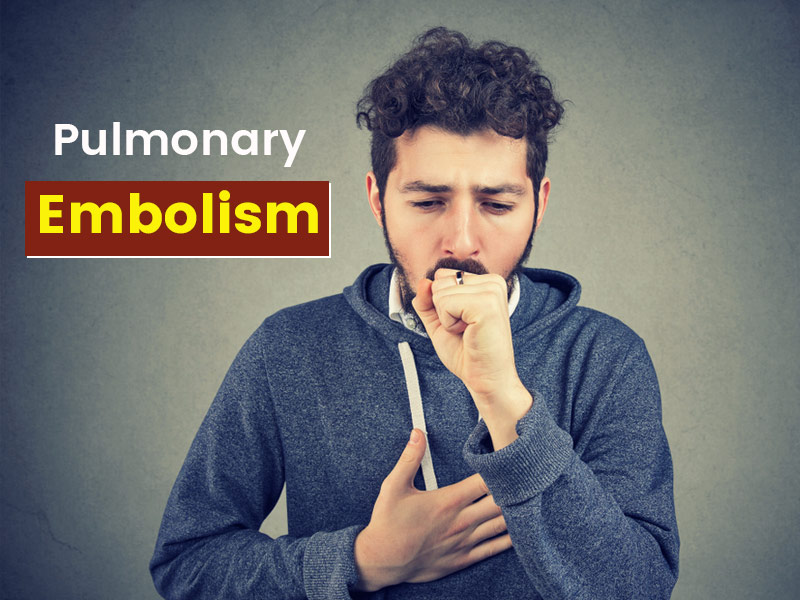
Lung infections can cause terrible actions because it can cause irritation and inflammation in the lung passage. Coughing at regular intervals is very exhausting and thus it becomes extremely important to tackle the symptoms of pulmonary embolism. Pulmonary embolism can be caused because of blood clots that travel through the lungs and results in infecting veins. It can be done through legs or veins and in other parts of the body. Because of clots in the body, it blocks blood flow that sometimes results to deep vein thrombosis. It might be confusing for you because of so numbers of lung diseases, let us look pulmonary embolism in detail.
Table of Content:-
What is Pulmonary Embolism?
We spoke to senior pulmonologist Dr. Arnav Trivedi from BNK Hospital, Bangalore to know about pulmonary embolism disease in detail. He told that pulmonary embolism is basically a blockage in any one of the arteries in the lungs. In majority of cases, this lung condition is caused because of clots that block blood flow going to lungs. Pulmonary embolism can be actually led to life-threatening complications at times. But immediate treatment can actually lower the risk of certain complications that come along with it. Taking some measures in order to protect the lungs can be effective considering doctor recommendations.

Symptoms of Pulmonary Embolism
This lung disease can vary greatly because of symptoms it shows on every individual. Pulmonary embolism can vary depending on the size of the clots, whether you have any underlying lung or heart condition or not, etc. Some common signs and symptoms of pulmonary embolism can include-
Shortness of breath- This is a typical symptom of most of the lung infections and diseases. Shortness of breath appears when you get an exertion of it gets worse with time. It could become a major hazard with time.
Chest Pain- Chest pain during pulmonary embolism can get you really worried because it feels like a minor heart attack. The pain is often very sharp and can dull your breathing and result to problems related to it.
Cough- As with any other condition of lung infection, cough during pulmonary embolism can be caused but it might become worse it you have bloody sputum or bloody cough.
Also Read- What Causes Gaps Between Teeth? Causes and Treatment
Other signs and symptoms of this lung infection can include-
- Fever
- Rapid or irregular heartbeat
- Too much sweating
- Having high fever
- Pain in the legs or swelling
- Clammy or discolored skin
What Causes Pulmonary Embolism?
Pulmonary embolism can occur when the blood clots and gets to your arteries. It can cause a major impact on your lungs and result other lung issues. These blood clots can also be caused because of deep veins in your legs. Deep vein thrombosis is one of the major causes of pulmonary embolism.
In some cases, there can be multiple clots that could be involved in the case of pulmonary embolism. One of the portions of each lung can die or can cause blockage in the artery. It is also possible that one particular artery might die in this condition which might lead to complications. This condition is called as pulmonary infraction. Due to this, it becomes even more hard for the lungs to provide oxygen to rest of the body.
Blockage in the veins of the blood vessels can also be due to-
- Air bubbles
- Part of tumor
- Fat accumulation from the marrow of broken long bone
Risk Factors of Pulmonary Embolism
Any condition that can cause develop blood clots in the vessels can increase the risk of pulmonary embolism. This can be affected because of the following factors-
1. Family history- One of factors that can influence pulmonary embolism can be if someone in your family has problem of blood clotting or pulmonary embolism in the past.
2. Heart diseases- Different kinds of heart diseases can result in occurrence of clot formation. Heart failure is one of the most likely causes. It affects people more than 40 years of age.
3. Cancer- Certain types of cancer such as brain, ovary, pancreas, colon, stomach, lung and kidney cancers can increase the risk of blood clots. Infact cancer treatment that involves chemotherapy can further increase the risk and result to increased risk of pulmonary embolism
Also Read- Hartnup Disease: Know Symptoms And Causes Of This Rare Condition
4. Surgery- This can one of the leading causes of blood clots. Due to medical disorder or conditions, some people who are more prone to clotting can develop pulmonary embolism.
5. COVID-19 – This recent disease has caused havoc in the past two years and can increase the risk of number of lung problems including pulmonary embolism. It can be one of the symptoms as well in severe covid infected patients.
Picture Credits- pixabay.com
Also watch this video
How we keep this article up to date:
We work with experts and keep a close eye on the latest in health and wellness. Whenever there is a new research or helpful information, we update our articles with accurate and useful advice.
Current Version

